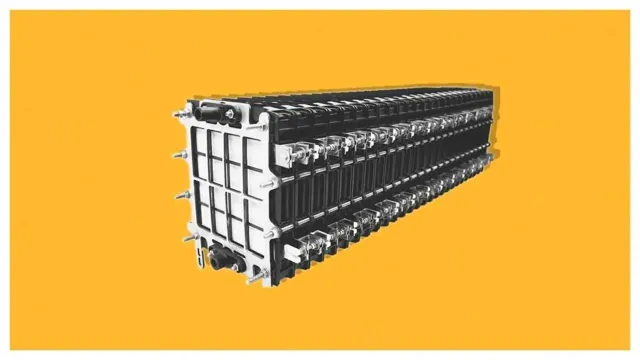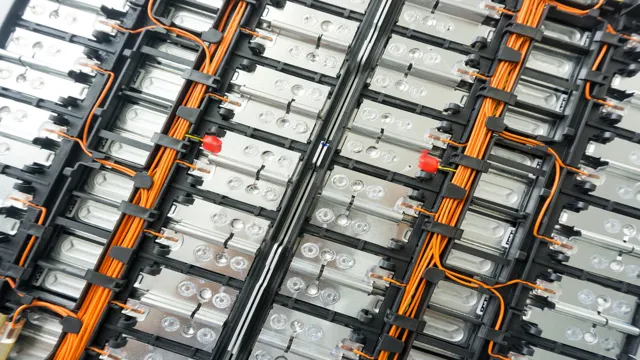Revolutionizing Indian Roads: Everything You Need to Know About Electric Car Battery Prices in India
Looking to switch to an electric vehicle in India? One of the most significant factors you’ll need to consider is the battery price. The battery is the heart of an electric car, and its cost can have a substantial impact on your decision to switch to an eco-friendly mode of transportation. While electric cars are known for their high price tags, it’s essential to understand the battery’s cost to make an informed decision.
In this blog, we’ll explore the electric car battery price in India, factors that affect the cost, and tips to choose the right battery for your vehicle. So, are you ready to delve into the world of electric car batteries and make an informed decision? Let’s get started!
Overview of Electric Car Batteries
Electric car battery prices in India can vary depending on the type of battery and the brand. The most common battery type used in electric cars is Lithium-ion, which has a higher energy density and longer lifespan compared to other battery types. The price for a Lithium-ion battery can range from ₹2 to ₹3 lakh in India, depending on the capacity and quality.
However, some battery manufacturers are also experimenting with alternative battery technologies such as Solid State or Zinc-air batteries, which could potentially provide a cheaper and more sustainable solution for electric cars in the long run. In any case, as the demand for electric cars rises, it is expected that battery prices will decrease over time and become more affordable for the consumers.
Types of Electric Car Batteries
When it comes to electric cars, the batteries are the heart of the vehicle. There are different types of electric car batteries being used in the market today. Lithium-ion batteries are the most commonly used in most EVs due to their high energy density, longevity, and efficiency in charging.
However, there are also other types of batteries such as lead-acid, nickel-metal hydride, and solid-state batteries. Lead-acid batteries are often used in low-speed EVs like golf carts and forklifts, while nickel-metal hydride batteries are used in hybrid cars. Solid-state batteries are still in the development stage, and they offer higher energy density and longer range but are more expensive.
Each type of battery has its advantages and disadvantages and may vary depending on the manufacturer and model of the vehicle. It’s essential to understand the different types of electric car batteries as it can impact the overall performance, range, and cost of the vehicle.

Cost of Manufacturing Electric Car Batteries
The cost of manufacturing electric car batteries fluctuates depending on multiple factors, including the size of the battery and the materials used in its construction. Generally, batteries that have larger storage capacity cost more to produce. Lithium-ion batteries are the most common type of battery used in electric vehicles today, and their manufacturing process involves many intricate steps that can be costly.
One of the main reasons for the high cost of electric car batteries is the expensive raw materials, such as cobalt and nickel. However, as technology advances and demand for electric vehicles grows, the cost of battery production has been gradually decreasing. In the future, it is expected that the cost of manufacturing electric car batteries will continue to decrease, making electric vehicles more accessible and affordable for consumers.
Current Electric Car Battery Prices in India
Electric car battery prices have been gradually declining in India due to the growth of electric vehicle usage in the country. In recent years, the prices of electric car batteries have come down by over 80% due to technological advancements and increasing demand. Currently, the prices of electric car batteries start at around
5 lakhs INR ($3,400 USD) and can go as high as 10 lakhs INR ($13,600 USD) depending on the car model and the battery capacity. However, as the Indian government aims to increase the number of electric vehicles in the country, the prices are expected to come down even further in the near future. With the increasing affordability of electric car batteries in India, more people can now consider switching to electric vehicles and contribute to a cleaner and more sustainable future.
Comparison of Battery Prices for Popular Electric Car Models
When it comes to electric cars, the cost of the battery is a significant factor. The prices of electric car batteries in India vary widely between different models. For instance, the Tata Nexon EV’s battery pack costs around INR
5 lakhs, while the MG ZS EV’s battery costs around INR 0 lakhs. The Hyundai Kona Electric has a battery cost of around INR 22 lakhs.
It’s also essential to note that battery prices tend to decrease over time, so newer models may have slightly lower rates. It’s worth keeping in mind that the battery contributes to a substantial portion of the EV’s total cost. Consequently, manufacturers are trying to reduce the cost by improving the technology and increasing production.
As a result, we can expect to see more affordable electric cars on Indian roads in the future.
Factors Affecting Electric Car Battery Prices in India
Electric car battery prices in India are affected by a multitude of factors. Currently, the prices for electric car batteries in India can vary heavily depending on a variety of factors, including the type of electric car, the type and capacity of the battery, and the manufacturer. Generally speaking, electric cars with larger batteries tend to be more expensive, as do those made by more established manufacturers.
Additionally, the cost of raw materials used in the production of these batteries can also impact pricing. As demand for electric cars continues to rise, it is likely that prices will gradually begin to decrease, as manufacturers find ways to produce high-quality batteries at a lower cost. However, it remains unclear how quickly and significantly these decreases will occur.
Sources for Electric Car Batteries in India
Electric car batteries have been the cornerstone of the electric vehicle revolution in India, and with the advancements in technology, their prices have been decreasing ever since their inception in the Indian market. Today, consumers can have access to a variety of options, making the purchase of an electric car battery more affordable than ever. The current prices of electric car batteries in India range from Rs.
5 Lakhs to Rs. 5 Lakhs, depending on the capacity and technology used in the battery.
The cost of an electric car battery system also varies based on the brand, the type of electric car, and the size of the battery required. It is also important to remember that owning an electric car battery in the country can be a more cost-effective alternative in the long run, especially when considering the cost of fuel as well. With more and more companies manufacturing electric car batteries in the country, the prices of these batteries are only expected to decline further in the coming years.
Future of Electric Car Battery Prices in India
Electric car battery prices in India are expected to decrease in the coming years as the government pushes towards more environmentally friendly modes of transportation. The Indian government has set a goal of having all new cars be electric by 2030, which will lead to an increase in demand for electric car batteries. This increase in demand will lead to more competition in the market, causing companies to lower their prices to stay competitive.
Additionally, as technology continues to improve and more efficient techniques are developed for manufacturing batteries, the cost of production will drop, leading to lower prices for consumers. While the current high cost of electric car batteries may be a barrier for many consumers, it is likely that this cost will continue to decrease in the future, making electric cars more accessible and affordable for the average Indian consumer.
Expected Trends in Electric Car Battery Prices
Electric car battery prices are expected to continue to decrease over the coming years, making them more accessible for consumers. This trend is particularly true in India, where the government has set ambitious targets for EV adoption. Furthermore, advancements in technology and increased production are likely to drive down costs even further.
For instance, lithium-ion battery prices have dropped by over 80% in the past decade due to economies of scale and technological improvements. However, it is important to note that battery prices are just one factor in the adoption of electric vehicles. Charging infrastructure, range anxiety, and consumer preferences also play a significant role in EV adoption.
Despite these challenges, the future of electric car battery prices in India looks promising, and we can expect to see increased adoption of EVs as a result.
Potential Factors that May Affect Future Electric Car Battery Prices
The future of electric car battery prices in India is an exciting but complex topic. There are many factors that can impact the cost of electric car batteries, making it difficult to predict exact prices. Some of the potential factors that may affect future electric car battery prices include advancements in battery technology, changes in government policies and subsidies, demand for electric vehicles, and the availability of raw materials required for battery manufacture.
As India aims to become a leader in electric vehicle adoption, it is likely that the government will introduce new policies and incentives to increase demand for electric cars. This may result in lower battery prices as manufacturers scale up production to meet demand. However, the prices will remain high until the manufacturers achieve economies of scale and technology improvements.
It is possible that the future of electric car battery prices in India will depend on a delicate balance between technological advancements, government policies and incentives, and changing economics of automobile industry as a whole.
Conclusion
In conclusion, while the price of electric car batteries in India may currently seem high, it’s important to remember that this technology is still relatively new and constantly evolving. Just like any other emerging technology, as production and market demand increase, prices are likely to decrease. Plus, with the many environmental and economic benefits of electric cars, investing in one may just pay off in the long run.
So, whether you’re a financially savvy car-buyer or a forward-thinking environmentalist, the electric car battery price in India is an investment worth considering!”
FAQs
What is the average price of an electric car battery in India?
The average price of an electric car battery in India is currently around INR 1.5 to 2 lakh for a 20 kWh battery pack.
Are electric car batteries in India cheaper than traditional car batteries?
No, electric car batteries are usually more expensive than traditional car batteries due to their advanced technology and materials used in their manufacturing.
How long does an electric car battery last in India?
The lifespan of an electric car battery in India depends on various factors such as driving conditions, maintenance, and usage. However, most electric car batteries in India are expected to last around 5 to 8 years.
Can the electric car battery be replaced or upgraded in India?
Yes, electric car batteries can be replaced or upgraded in India. However, it may depend on the make and model of the electric car and the availability of compatible batteries. It is recommended to consult with the car manufacturer or authorized service center before making any changes to the battery.





